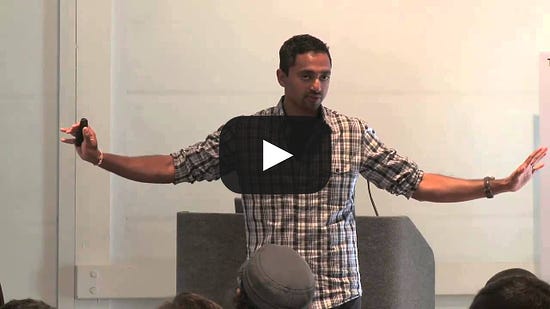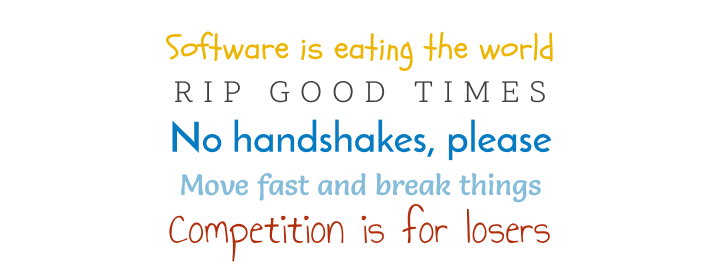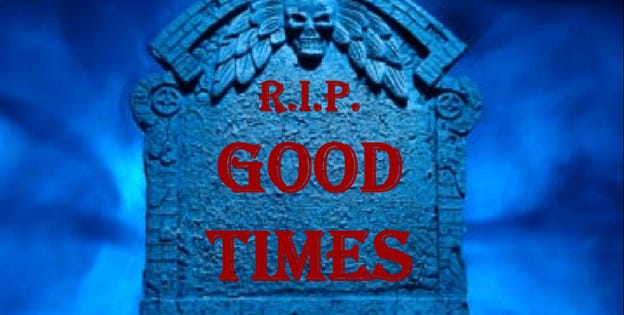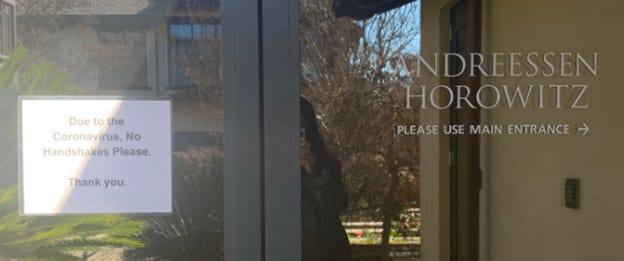Silicon Valley Outsider - Silicon Valley Lore
Silicon Valley LoreThe stories behind the catchphrases that you're "supposed to know"
Silicon Valley has a language all its own, and it’s my job in this newsletter to be your translator. In some cases, one-to-one translations will be enough. “ARR” means annual recurring revenue, often from software subscriptions, “cap table” means a list of names and their percent ownership of a startup, and so on. But in others, understanding Silicon Valley folks requires understanding the lore, not just the lingo. Startup folks often make short-hand reference to a shared bank of stories that they expect you to know.This isn’t malicious — shorthand is efficient — but lore can be exclusionary for folks who aren’t in the know. And, although there is nothing less cool than explaining an inside joke, it’s my moral duty as a former Outsider to teach you the entrepreneurial lore that can help you achieve Silicon Valley fluency. And, who knows: you might even learn some Silicon Valley wisdom along the way. “Software is eating the world.” — Marc AndreessenIn 2011, Marc Andreessen (who built the world’s first internet browser) predicted that the next decade would be a renaissance for software startups. At the time, there were just ten startups worth over $1 billion (Facebook, Twitter, Zynga, Groupon, LinkedIn, and five others you’ve never heard of), and Andreessen thought that number was about to skyrocket. His argument was that the benefits of software — zero marginal costs, fast prototyping and development — were ready to take hold, as the normal costs associated with hardware development were rapidly dropping:
To put it lightly, Andreessen was right: the 2010s were a legendary decade for startup activity. Today, there are 738 billion-dollar startups, and it’s hard to think of an industry that remains untouched by Silicon Valley-style innovation. “RIP Good Times” — SequoiaIn October 2008, the U.S. economy was still reeling from the subprime mortgage crisis, and legendary venture capital fund Sequoia had a succinct message for its CEOs: In a now-legendary, 56-slide presentation, Sequoia’s partners laid out a bleak picture of a prolonged economy recovery that would force its portfolio companies to “GET REAL or GO HOME.” Alfred Lin, now a partner at Sequoia, said:
This presentation was frequently referenced at the beginning of the coronavirus pandemic as folks wondered if Sequoia would issue another presentation (it did, in March 2020), and it’s often summoned as an example of the no-nonsense attitude that founders need to have in order to effectively run their companies. Reality can often be painful for startups, and running towards the pain (or smashing your portfolio companies with it) is sometimes the only solution. “No handshakes, please.” — Andreessen HorowitzIn February 2020, Silicon Valley was sounding the coronavirus alarm well before the rest of the country. Balaji Srinivasan (an entrepreneur, investor, and Bitcoin enthusiast) was perhaps the first, and Andreessen Horowitz followed suit, posting a sign on the front door of its HQ in early February to kick off coronavirus precautions: At the time, there were less than 20 confirmed cases of coronavirus in the Unites States, and the “no handshakes” sign was openly mocked as a result. The sign is today remembered (somewhat smugly) as a symbol of Silicon Valley’s ability to think independently and act on new data, even in the face of criticism. In the words of OpenAI CEO Sam Altman:
“Move fast and break things.” — FacebookThe early motto of Facebook was the siren’s call of the second wave of internet startups: scale, scale, and scale some more — and let caution be damned. The startup world was obsessed with building Minimum Viable Products (as popularized by Eric Reis), with iterating quickly, and with building aggressive organizations optimized for growth. Chamath Palihapitiya, now a vocal investor riding the SPAC wave, was the head of Facebook’s growth team in those early days, and his explanation was characteristically blasé:
In reality, the Facebook Growth team was a machine. They were ruthless and methodical in their application of quantitative frameworks for growing the Facebook userbase and maximizing the time each user spent on the app. One employee quoted Chamath as saying “It’s f***ing land-grab time, so get all of the f***ing land you can get.”  Nowadays, the tech industry has been lambasted for its “growth at all costs” mindset, most notably in The Social Dilemma, the 2020 Netflix film that led me to shut down by Facebook and Instagram accounts — and Facebook’s “move fast and break things” is the central point of the anti-tech backlash that is rapidly gaining traction in the US. (Also, one final easter egg here. This motto has been replaced at Facebook with the funniest, most corporate-BS rewrite of all time: “Move fast with stable infrastructure.”) “Competition is for losers.” — Peter ThielI could summarize this one, or I could let Peter Thiel (the founder of Paypal and the venture capital firm Founders Fund) do it in his own words. This talk is one of my favorites in the Y Combinator oeuvre; I’d recommend you all check it out if you haven’t already.  This talk/saying is the final item on this list because it exemplifies Silicon Valley contrarianism — it took a piece of common knowledge, that startups are best when they have “first mover advantage,” and argued the opposite, that they should instead try to be the last movers in a market they can monopolize. Thanks for reading Silicon Valley Outsider! Here are a few past editions that you might like if you enjoyed this one: If you want to join 450 folks in getting an email from me each Monday, I’ll help you understand Silicon Valley using normal-human words. If you liked this post from Silicon Valley Outsider, why not share it? |
Older messages
Should I have shut down my startup?
Monday, July 12, 2021
Someone else is executing on my idea... I might have been very wrong
Startup resources, and how to work hard
Tuesday, July 6, 2021
Two retweets this week: Lea Boreland and Paul Graham
The most important skill in Startup Land: Drive
Monday, June 28, 2021
Operator Skill Tree: Edition #1
Are Midwestern values incompatible with startup success?
Saturday, June 26, 2021
For most people, but obviously not for all — let me explain.
Re-introducing Silicon Valley Outsider
Saturday, June 26, 2021
A newsletter for startup-interested folks who live outside the SF Bay Area
You Might Also Like
[CEI] Chrome Extension Ideas #180
Tuesday, March 4, 2025
ideas for Figma, GitHub, Job Applicants, and stud ͏ ͏ ͏ ͏ ͏ ͏ ͏ ͏ ͏ ͏ ͏ ͏ ͏ ͏ ͏ ͏ ͏ ͏ ͏ ͏ ͏ ͏ ͏ ͏ ͏ ͏ ͏ ͏ ͏ ͏ ͏ ͏ ͏ ͏ ͏ ͏ ͏ ͏ ͏ ͏ ͏ ͏ ͏ ͏ ͏ ͏ ͏ ͏ ͏ ͏ ͏ ͏ ͏ ͏ ͏ ͏ ͏ ͏ ͏ ͏ ͏ ͏ ͏ ͏ ͏ ͏ ͏ ͏ ͏ ͏ ͏ ͏ ͏ ͏ ͏ ͏
500k subs & 7 figs in revenue
Tuesday, March 4, 2025
This founder was still in college when he sold the business ͏ ͏ ͏ ͏ ͏ ͏ ͏ ͏ ͏ ͏ ͏ ͏ ͏ ͏ ͏ ͏ ͏ ͏ ͏ ͏ ͏ ͏ ͏ ͏ ͏ ͏ ͏ ͏ ͏ ͏ ͏ ͏ ͏ ͏ ͏ ͏ ͏ ͏ ͏ ͏ ͏ ͏ ͏ ͏ ͏ ͏ ͏ ͏ ͏ ͏ ͏ ͏ ͏ ͏ ͏ ͏ ͏ ͏ ͏ ͏ ͏ ͏ ͏ ͏ ͏ ͏ ͏ ͏ ͏ ͏ ͏
1,000,000
Tuesday, March 4, 2025
Taking a moment to celebrate and reflect—and then back to work ͏ ͏ ͏ ͏ ͏ ͏ ͏ ͏ ͏ ͏ ͏ ͏ ͏ ͏ ͏ ͏ ͏ ͏ ͏ ͏ ͏ ͏ ͏ ͏ ͏ ͏ ͏ ͏ ͏ ͏ ͏ ͏ ͏ ͏ ͏ ͏ ͏ ͏ ͏ ͏ ͏ ͏ ͏ ͏ ͏ ͏ ͏ ͏ ͏ ͏ ͏ ͏ ͏ ͏ ͏ ͏ ͏ ͏ ͏ ͏ ͏ ͏ ͏ ͏ ͏ ͏ ͏ ͏ ͏
BSSA #116 - Outsourcing to scale 🚀
Tuesday, March 4, 2025
March 04, 2025 | Read Online Hello everyone! The Wide Event is almost sold out. More than 90% of the tickets have been booked. If you're one of the people waiting until the last minute to purchase,
🔥 The secret factories big brands don’t want you to know 👗👖
Tuesday, March 4, 2025
The best fashion suppliers don't advertise—here's how to find them. Hey Friend , If you've ever struggled to find high-quality fashion manufacturers, there's a reason: The best
Making Wayves
Tuesday, March 4, 2025
+ Girls just wanna have funding; e-bike turf war View in browser Powered by ViennaUP Author-Martin by Martin Coulter Good morning there, Since 2021, VC firm Future Planet Capital (FPC) has secured more
Animal Shine And Doctor Stein 🐇
Monday, March 3, 2025
And another non-unique app͏ ͏ ͏ ͏ ͏ ͏ ͏ ͏ ͏ ͏ ͏ ͏ ͏ ͏ ͏ ͏ ͏ ͏ ͏ ͏ ͏ ͏ ͏ ͏ ͏ ͏ ͏ ͏ ͏ ͏ ͏ ͏ ͏ ͏ ͏ ͏ ͏ ͏ ͏ ͏ ͏ ͏ ͏ ͏ ͏ ͏ ͏ ͏ ͏ ͏ ͏ ͏ ͏ ͏ ͏ ͏ ͏ ͏
upcoming analyst-led events
Monday, March 3, 2025
the future of the customer journey, tech M&A predictions, and the industrial AI arms race. CB-Insights-Logo-light copy Upcoming analyst-led webinars Highlights: The future of the customer journey,
last call...
Monday, March 3, 2025
are you ready? ͏ ͏ ͏ ͏ ͏ ͏ ͏ ͏ ͏ ͏ ͏ ͏ ͏ ͏ ͏ ͏ ͏ ͏ ͏ ͏ ͏ ͏ ͏ ͏ ͏ ͏ ͏ ͏ ͏ ͏ ͏ ͏ ͏ ͏ ͏ ͏ ͏ ͏ ͏ ͏ ͏ ͏ ͏ ͏ ͏ ͏ ͏ ͏ ͏ ͏ ͏ ͏ ͏ ͏ ͏ ͏ ͏ ͏ ͏ ͏ ͏ ͏ ͏ ͏ ͏ ͏ ͏ ͏ ͏ ͏ ͏ ͏ ͏ ͏ ͏ ͏ ͏ ͏ ͏ ͏ ͏ ͏ ͏ ͏ ͏ ͏ ͏ ͏ ͏ ͏ ͏ ͏ ͏
🦄 Dimmable window technology
Monday, March 3, 2025
Miru is creating windows that uniformly tint—usable in cars, homes, and more.




